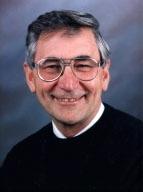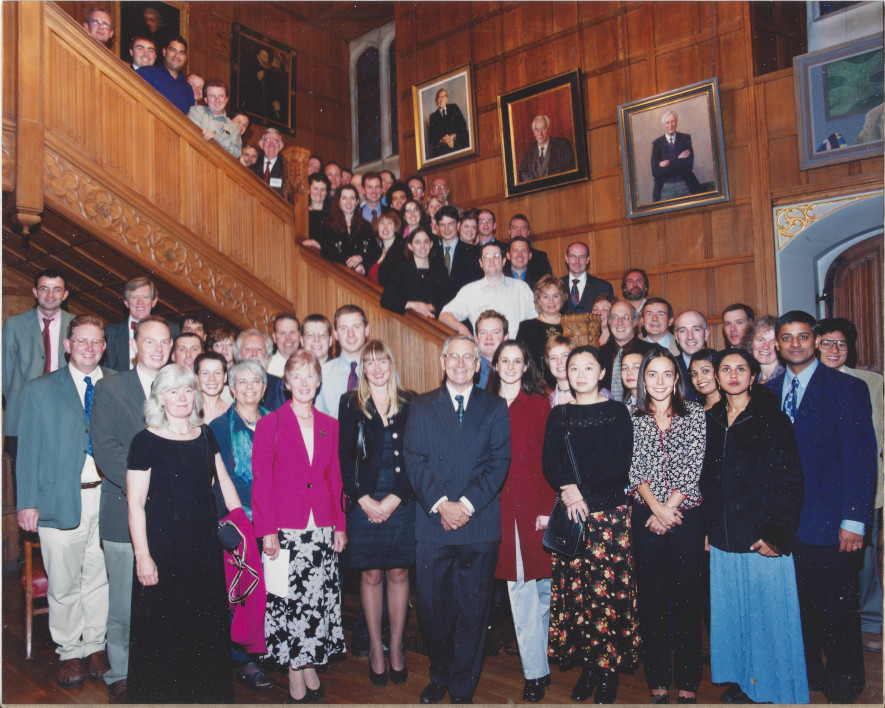
We are sad to report that our colleague, Professor Jim Staunton, died on 13 July 2023 at the age of 88.
Jim was born in Liverpool in the first quarter of 1935 and brought up there. In the late 1950s he completed his PhD at the University of Liverpool, working on structure determination of the fungal natural products Sclerotiorin and Rotiorin (both polyketides), under the supervision of (William) Basil Whalley.
Jim went on to do a postdoc in the early 60s with Carl Djerassi at Stanford University, doing optical rotary dispersion studies, and returned to Liverpool to be Alan Battersby's lieutenant, working on alkaloid biosynthesis.
Jim moved with Alan to Cambridge in 1969, making it a condition of his move that he got a fellowship at a college, which Alan duly arranged at St John’s. Jim also started his independent research in Cambridge, choosing to study the biosynthesis of polyketides, which distinguished his research from that of Alan on alkaloids and tetrapyrroles. In the early years in Cambridge Jim also had joint students with Alan, studying stereochemistry of enzymic reactions.
Jim is perhaps best known for his work with Professor Peter Leadlay FRS on the biosynthesis of polyketides such as erythromycin, leading to the founding of the start-up Biotica Technology Limited, to engineer novel polyketides with therapeutic potential.
Jim, who was widely regarded as a leader in his field, was elected a Fellow of the Royal Society in 1998, for his “outstanding contributions to our knowledge of the biosynthesis of natural products." The Royal Society notes that he pioneered the use of electrospray mass spectrometry for the detection of intermediates bound to enzymes involved polyketide biosynthesis and that his research on polyketide synthases (PKS) has transformed knowledge of these enzymes.
Throughout his career Jim was very supportive of his group and encouraged them into academic careers. Jim was a gender champion before such roles were even thought of, and for much of the time his group was predominantly female (possibly at one point it was female-only), with a high proportion going into academic careers after their PhDs.
A few years after Jim retired in 2001, he moved from Cambridge to Leamington Spa. He is survived by his wife Ruth.
 Jim's retirement dinner.
Jim's retirement dinner.
Memories of Jim
Professor Finian Leeper
I came to St John's College as an undergraduate in October 1972. I probably met Jim in my first year, but he did not supervise me in Organic Chemistry until Part IB and Part II. I started my PhD with him in Oct 1975, studying "Biomimetic synthesis of polyketides".
Towards the end of my PhD Jim said he thought I had a future in academia and he advised me to do a postdoc, so I secured a position with Ian Spenser in Canada-- I am sure this was in no small way due to Jim's recommendation.
Back in Cambridge as a Research Fellow (again due to Jim’s influence), I worked in Jim's group on biosynthesis (rather than biomimetic synthesis) of polyketides. We had joint group meetings with Alan Battersby's group. Towards the end of my fellowship Alan called me into his office to offer me a demonstratorship as his lieutenant. I am sure Alan must have discussed this in advance with Jim, so again Jim was a huge influence on my career.
Students (or postdocs) that I can think of that went into academia are: Mary Garson (U. of Queensland), John Murphy (Strathclyde), Ernest Laue (Biochemistry, Cambridge), Chris Abell (Cambridge), Jill Barber (Manchester), Alison Hill (Exeter), Bob Hill (Glasgow), Helen Hailes (UCL), Bernard Rawlings (Leicester), Sandeep Handa (Leicester), and there are probably many others.
In summary I am very grateful to Jim for his influence and guidance to me and many other chemists in the early stage of our careers. His good humour and wit will be particularly missed.
Finian is an Emeritus Professor, University of Cambridge.
Professor Mary Garson
I am feeling very sad and nostalgic about Cambridge today. Jim was a gender champion before such roles were ever understood, let alone invented. I would never have been in the wonderful role(s) that I’ve held had it not been for his encouragement and calm advice, and not just on matters scientific either.
Mary completed her PhD with Jim 1974-1977 and is Emeritus Professor, School of Chemistry and Molecular Biosciences, University of Queensland.
Dr Ted McDonald
Jim was a young lecturer and collaborator with Alan Battersby at Liverpool when I started my PhD in 1964. We both were brought up in Liverpool and got on well, so that in addition to interacting constructively in the lab, Pat and I became social friends with Jim and Ruth when we arrived in Cambridge in 1969, and had some great times together. He never seemed to age and remained consistently young at heart. We will miss him greatly.
Ted completed his PhD with Alan Battersby in Liverpool. After a postdoc in the US he returned to Cambridge as a Demonstrator, before going into agrochemical/pharmaceutical companies.
Dr Ray Jones
Jim was my PhD co-supervisor 1970-73, and a great sounding board for thoughts, worries, etc., forming an excellent team with Prof Battersby. A loss to the chemistry community.
Ray is Emeritus Professor of Organic and Biological Chemistry, Loughborough University.
Dr Andrew Stachulski
I'm truly saddened by the news of Jim Staunton's death. I knew him well in the Cambridge days during my PhD years, when he worked alongside Alan Battersby, and indeed I met him at Alan's funeral in 2018. Previously he was at my current department at Liverpool. Jim made great contributions to chemistry and was a thoroughly charming man: I shall really miss him.
Andrew is a Senior Research Fellow, University of Liverpool.
Alison Hill
Jim was a wonderful PhD supervisor (I learned a lot) and supportive throughout my career. For many years, Tom Simpson, Chris Willis, Helen Hailes, and I (and sometimes Bernard Rawlings) would meet a couple of times a year for a fancy meal in London for a gossip and a catch up. We emailed regularly to discuss politics (and occasionally science).
Alison was a PhD student with Jim in the1980s. She is Associate Professor (Chemistry and Biochemistry), University of Exeter.
Professor John Murphy
I am saddened to hear of Jim's death. His chemistry contribution was great and he provided great supervision to his PhD students. 88 is a very good age. I hope that he passed away peacefully.
John Murphy completed his PhD with Jim 1976-79 and is Merck-Pauson Professor of Chemistry, University of Strathclyde.
Professor Nick Turner
I first met Jim when he was my PhD Examiner in 1985. I always found him a source of inspiration and someone to seek out at conferences for a friendly chat.
Nicholas J Turner FRS is Professor of Chemical Biology, Manchester Institute of Biotechnology, University of Manchester.
Professor Andy Holmes
Jim was a role model for so many of us, and through also having arrived as an academic in Cambridge (with Sir Alan Battersby) with no previous experience of the University. It was noted by a number of eminent female former research students that Jim was a pioneer in mentoring women research students. For me he was also a role model in carrying out major DIY projects on his home in Porson Road that I tried to emulate (not nearly as successfully!). Some of the more innovative changes in the teaching of organic chemistry were initiated by Jim in the 1970s and 80s. Jim and Ruth took us under their wing as new arrivals in Cambridge in 1972 and showed us much generous hospitality.
Andrew Holmes FRS was a lecturer in the Department of Chemistry, Cambridge from 1972, becoming Director of the Melville Laboratory for Polymer Synthesis from1994 to 2004, when he returned to Australia to join the University of Melbourne, where he is Melbourne Laureate Professor Emeritus.

